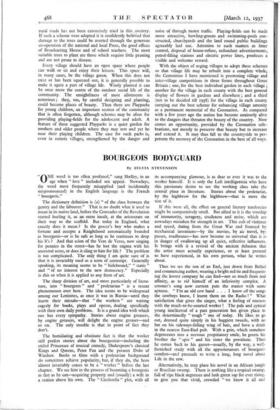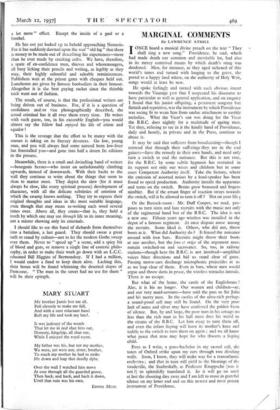BOURGEOIS BODYGUARD
By SYLVIA STEVENSON "ChNE word is too often profaned," sang Shelley, in an J age when " love " included sex appeal. Nowadays, the word most frequently misapplied (and incidentally mispronounced) in the English language is the French " bourgeois."
The dictionary definition is (a) " of the class between the gentry and the labourer." That is no doubt what it used to mean in its native land, before the Comrades of the Revolution started hurling it, as an extra insult, at the aristocrats on their way to the scaffold. But today in England, what exactly does it mean ? Is the grocer's boy who makes a fortune and accepts a Knighthood automatically branded as bourgeois—or is he safe as long as he continues to drop his h's ? And that scion of the Vere de Veres, now singing for pennies in the street—has he lost the stigma with his ancestral acres, or does it cling to him for life ? The problem is too complicated. The only thing I am quite sure of is that it is invariably used as a term of contempt. Generally speaking, its meaning seems to be " hidebound," " static " and " of no interest to the new democracy." Especially is this so when it is applied to any form of art.
The sharp division of art, and more particularly of litera- ture, into " bourgeois " and " proletarian " is a recent phenomenon over here. The idea seems to be widespread among our Leninites, as once it was in Russia—until they learnt their mistake—that " the workers " are waiting eagerly for books, plays and operas, dealing specifically with their own daily problems. It is a grand idea with which one has every sympathy. Stories about engine greasers, by engine greasers, will delight the engine greaser—and so on. The only trouble is that in point of fact they don't.
The humiliating and obstinate fact is that the worker still prefers stories about the bourgeoisie—including the exiled Princesses of musical comedy, Shakespeare's classical Kings and Queens, Peter Pan and the present Duke of Windsor. Books or films with a proletarian background do sometimes achieve popularity, but, if they do, the hero almost invariably ceases to be a " worker " before the last chapter. We see him in the process of becoming a bourgeois as fast as be can—acquiring property and (usually) a wife in a station above his own. The " Cinderella " plot, with all its accompanying glamour, is as dear as ever it was to the worker himself. It is only the Left intelligentsia who have this passionate desire to see the working class take the central place in literature. Stories about the proletariat, by the highbrow for the highbrow—that is more the size of it.
If this were all, the effect on general literary tendencies might be comparatively small. But allied to it is the worship of immaturity, savagery, crudeness and noise, which are nowadays mistaken for strength in art. This cult of violence and speed, dating from the Great War and fostered by mechanical inventions—by the movies, by air travel, by- passes, roadhouses—has now become so universal that it is in danger of swallowing up all quiet, reflective influences. It brings with it a revival of the ancient delusion that the artist must actually experience, or at least pretend to have experienced, in his own person, what he writes about.
Thus we see the son of an Earl, just down from Balliol and commencing author, wearing a bright red tie and frequent- ing the lowest company he can find—not so much from real affinity, as to rid himself of an inferiority complex. A crooner's song now current puts the matter with some aptness. " I'm an old cow hand . . . I know all the songs the cowboys know, I learnt them on the Radio ! " What satisfaction that gives the singer, what a feeling of oneness with the much-to-be-courted worker ! The pale and cynical young intellectual of a past generation has given place to the determinedly " tough " one of today. He likes to go out, dressed quite simply in his baggiest tweeds, with no hat on his sideways-falling wing of hair, and have a drink in the nearest East-End pub. With a grin, which somehow degenerates into a nervous propitiatory smile, he greets his brother the " spiv " and his sister the prostitute. Then he comes back to his garret—usually, by the way, a well- furnished study with all the appurtenances of bourgeois comfort—and proceeds to write a long, long novel about Life in the raw.
Alternatively, he may place his novel in an African jungle or Brazilian swamp. There is nothing like a tropical swamp, full of ripe black negresses and lush green sap for ever rising, to give you that vivid, crowded. " we know it all and a lot more " effect. Except the inside of a gaol or a brothel.
He has not yet looked up to behold approaching Nemesis. For it has suddenly dawned upon the real " old lag " that there is money to be made out of describing his experiences—more than he ever made by cracking cribs. We have, therefore, a spate of ex-confidence men, thieves and whoremongers, all busy licking their pencils and writing, as legibly as they may, their highly colourful and saleable reminiscences. Publishers wait at the prison gates with cheques held out. Luncheons are given by famous booksellers in their honour. Altogether it is the best paying racket since the thimble trick went out of fashion.
The result, of course, is that the professional writers are being driven out of business. For, if it is a question of sordidness and/or vice photographically described, the actual criminal has it all over them every time. He writes with such gusto, too, in his execrable English—you would almost say the fellow had enjoyed his life of crime and squalor !
This is the revenge that the effort to be matey with the masses is taking on its literary devotees. Go low, young man, and you will always find some natural born low-liver has forestalled you—and gone into half a dozen fat editions in the process.
Meanwhile, there is a small and dwindling band of writers —bourgeois heroes—who insist on unfashionably climbing upwards, instead of downwards. With their backs to the wall they continue to write about the things that seem to them to matter most. They depict the slow (for it must always be slow, like every spiritual process) development of character, with all the delicate subtleties of emotion of which the swamp knows nothing. They try to express their original thoughts and ideas in the most suitable language, even though that may mean re-writing each word several times over. Above all, they create—that is, they hold a torch by which one may see through life to its inner meaning, not a mirror showing only its externals.
I should like to see this band of diehards form themselves into a battalion, a last guard. They should swear a great oath to stand by culture—not to let the modern Goths sweep over them. Never to " speed up " a scene, add a spicy bit of blood and guts, or remove a single line of esoteric philo- sophy, in order to make their work go down with an L.C.C. educated Bill Higgins of Bermondsey. If I had a million, I would endow a fund to keep them alive. Lacking this, their bones will be found whitening the deserted slopes of Parnassus. " The man in the street had no use for them " will be their epitaph.















































 Previous page
Previous page